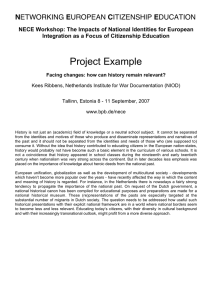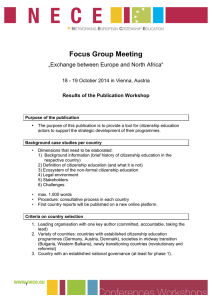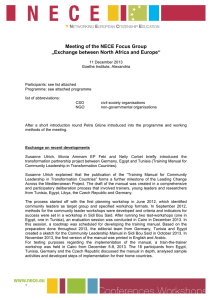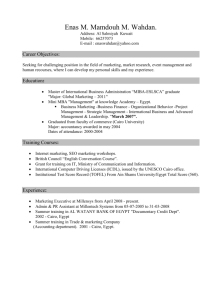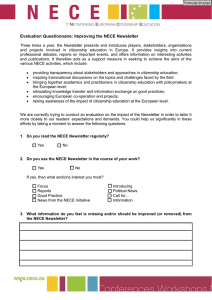NECE Focus Group: Exchange between Europe and North Africa
advertisement
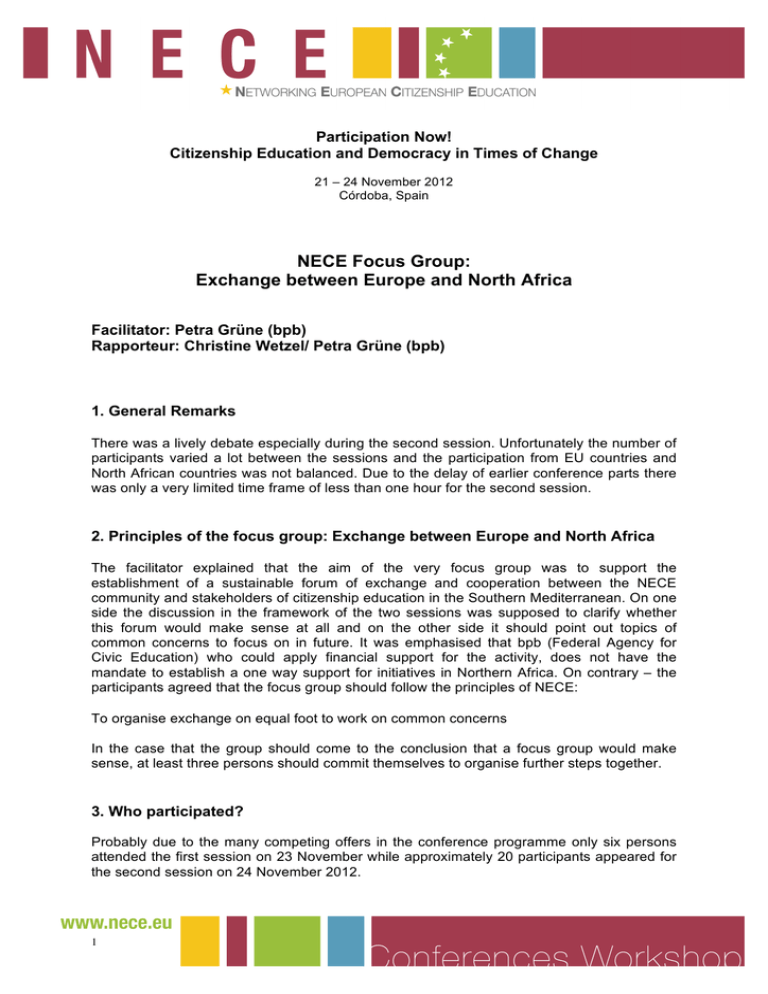
Participation Now! Citizenship Education and Democracy in Times of Change 21 – 24 November 2012 Córdoba, Spain NECE Focus Group: Exchange between Europe and North Africa Facilitator: Petra Grüne (bpb) Rapporteur: Christine Wetzel/ Petra Grüne (bpb) 1. General Remarks There was a lively debate especially during the second session. Unfortunately the number of participants varied a lot between the sessions and the participation from EU countries and North African countries was not balanced. Due to the delay of earlier conference parts there was only a very limited time frame of less than one hour for the second session. 2. Principles of the focus group: Exchange between Europe and North Africa The facilitator explained that the aim of the very focus group was to support the establishment of a sustainable forum of exchange and cooperation between the NECE community and stakeholders of citizenship education in the Southern Mediterranean. On one side the discussion in the framework of the two sessions was supposed to clarify whether this forum would make sense at all and on the other side it should point out topics of common concerns to focus on in future. It was emphasised that bpb (Federal Agency for Civic Education) who could apply financial support for the activity, does not have the mandate to establish a one way support for initiatives in Northern Africa. On contrary – the participants agreed that the focus group should follow the principles of NECE: To organise exchange on equal foot to work on common concerns In the case that the group should come to the conclusion that a focus group would make sense, at least three persons should commit themselves to organise further steps together. 3. Who participated? Probably due to the many competing offers in the conference programme only six persons attended the first session on 23 November while approximately 20 participants appeared for the second session on 24 November 2012. 1 The following participants contributed to the results: Moez Ali, Union des Tunisiens Indépendants pour la Liberté (UTL), Tunisia “Bus Citoyen”-Project reached 200.000 people Prof. Dr. Azelarabe Lahkim Bennani, University of Fez, Morocco Organisation for Human Rights Gabriele Becker, Goethe-Institut Cairo, Egypt Two conferences upcoming on good governance and CE, cultural innovators network Manfred Wirtitsch, Federal Ministry for Education, the Arts and Culture (BMUKK) in Austria Petra Bálint, Alumni of the Fellowship Programme „Shaping Europe - Civic Education in Action" German Institute of Human Rights, Brussels based EU-project: text writing creativity workshop on freedom of speech Margareta Hauschild, Goethe-Institut Madrid, Spain Maram Hassan Anbar, Freelancer, Spain Dina Moustafa Ahmed Abou Zeid, Media Vision Company, Egypt Rana Gaber, Egyptian Youth Federation, Egypt Mona Shahien, Goethe Institut Cairo, Egypt Tahany Shemis, Misr Elkheir Foundation Ahmed Hassan, Goethe Institut Cairo, Egypt Nelly Corbel, The American University in Cairo, Egypt Ahmed Naguib, The Egyptian Foundation for Finance and Development, Egypt Marion Schmidt, Goethe Institut Cairo, Egypt Jakob Erle, The Danish Egyptian Dialogue Institute in Cairo, Egypt Prof. Dr. Ahmed Driss, Centre of Mediterranean and International Studies in Tunis, Tunisia Nada El-Akad, SAAP / Support of the Association Agreement and Action Plan Programme, Egypt 2 4. What is already going on? The discussants agreed that the focus group should not „reinvent the wheel“ by planning activities that already exist. The collection of existing projects and programmes was the first step though. Participants collected their information about: • • • Existing cooperation (projects) between Europe and North Africa Recent plans and dispositions Existing networking activities (Complete collection: see attachment) 5. Needs and Ideas Probably because of the low number of European participants and the recent developments in the area the collection of ideas focussed completely on the situation in the countries of North African. Following areas have been tackled most by the participants: 5.1 Infrastructure and capacity building During the discussion needs and ideas concerning the lack of infrastructure in North Africa were frequently mentioned. In concrete the issue of funding was emphasised as many of the NGOs have to finance their activities on their members private budget. It was mentioned i.e. that 80% of NGOs in Tunisia don't even have offices. Capacity building and professionalizing in terms of management, leadership, communication skills, project evaluation and reporting skills were identified as the most important issues. Core question were how to run an organisation sustainably with little means and how to involve volunteers. 5.2 Human Right Education Other topics were different concerns around human rights education. The need for training in teaching methods and useful materials in human rights education where mentioned frequently. 5.3 Basic Civic and Citizenship Education for different target groups Basic citizenship and civic education in general were proposed as a point of special concern. This included teaching methods and approaches to the topic in general and included voting education as a specific issue. The question of how to reach people of lower education and the rural population was also dressed. 3 5.4 Government and Civil Society How to organise the dialogue between civil society and government in general and enhance citizenship education were identified as crucial questions as well. In this context the “School of Politics” (presented in Workshop 6 on 23 November 2012) was pointed out as a good example. 5.5 Transparency and Networking Several participants from North Africa confirmed that a lot of initiatives and NGOs would already exist but they would be working more or less isolated mainly because of the two following reasons: Potential competition for funds and ideas and especially the lack of tools and opportunities for networking. 6. Conclusions and Agreements After reconsidering the principles of the focus group and the capacities as well as the possibilities of NECE and the bpb the group identified general aims and future steps. All participants agreed that the aims should not be formulated too ambitious and that projects should correspond well with activities that the participating institutions/initiatives/persons would conduct anyway. 6.1 Support Matchmaking The NECE platform should provide support for matchmaking between European and North African institutions concerning concrete projects. 6.2 Support Networking and Transparency between stakeholders of Citizenship Education in North Africa and establish exchange with counterparts in Europe The participants from North Africa agreed to work on an initiative to promote networking in the context of citizenship in the region (NACE - Networking Arabic Citizenship Education). In this context another meeting in spring 2013 should be organised. During this meeting preparations should be made for the regional initiative as well as preparations for further exchange with the European side. The participants would highly appreciated the possibility of keeping in touch with the NECE activities and participate in future conferences. While collecting existing initiatives during the first session the participants from Goethe Institute and Tahrir Lounge Cairo also announced that they would plan a conference on citizenship education in Cairo in 2013. Participants suggested though to clarify whether this conference would be a suitable opportunity for the intended meeting. The idea of organising a separate workshop with participants from both sides of the Mediterranean in order to prepare a session for the upcoming NECE conference in The Hague was preliminary postponed. 4 7. Responsibilities All participants from North Africa declared that they would further participate in the focus group. Petra Grüne from the bpb (Federal Agency for Civic Education) will coordinate further steps as a representative of NECE. 8. Next Steps The minutes will be send to all participants and will be published at the NECE website. The NECE coordinators will provide opportunities for matchmaking via the existing NECE channels. Additionally they will further contribute to the collection of existing cooperation projects between Europe and North Africa. The NECE coordinators will apply for funds to finance further exchange on Citizenship Education between Europe and North Africa Goethe Institut/ Tahrir Lounge will inform the participants about further developments concerning the upcoming conference in Cairo NECE Coordinators will provide a list of available and accessible material concerning the needs mentioned above (i.e. human rights education) 5
